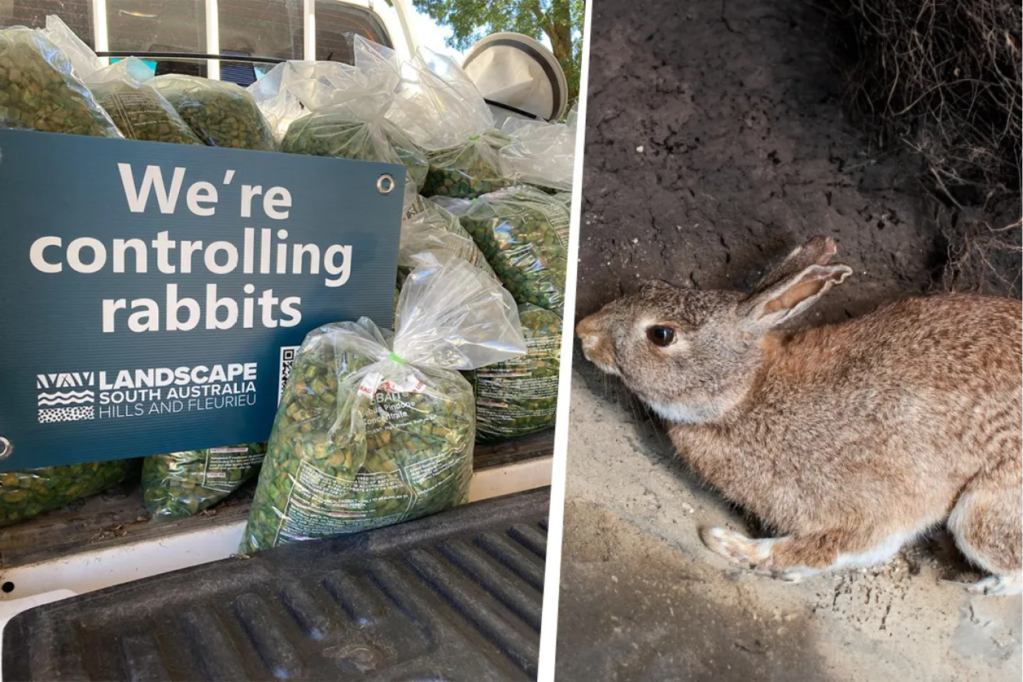Killer carrots campaign as rabbits rebound in Hills
UPDATED | A council is preparing to release treated carrots in a bid to control rabbit numbers which have surged throughout the Adelaide Hills.

Landscape Hills and Fleurieu are teaming up with the Mt Barker District Council to release RHDV K5 Calicivirus-innoculated carrots across 20 sites on council land.
“Council has had an increased number of complaints from residents in the last 12 months relating to the number of rabbits in the area and the damage caused,” Phil Burton, Mount Barker District Council’s general manager for infrastructure told InDaily.
“Unfortunately, rabbits are clearly reducing biodiversity in the district and control programs are required to reduce their impact. If we are able to maintain low rabbit populations, this will significantly reduce the amount of control required in future years.”
The first step, which is currently underway, is to release untreated carrots in the planned locations, encouraging wild rabbits to eat them before the virus is released via the vegetables in early February.
“To ensure the success of this initiative, it is crucial for the public to refrain from disturbing carrot trails at these identified sites,” said Landscapes Hills and Fleurieu senior stewardship officer Dana Miles.
You might like
The carrots will be inoculated specifically with the RHDV virus which, while harmful to rabbits, poses no threat to other wildlife or domestic animals.
“It is essential to note that RHDV K5 Calicivirus affects rabbits exclusively, posing no threat to dogs, possums, birds, or humans, making it a safe control option in residential areas,” Miles said.
Those with pet rabbits are strongly urged to have them vaccinated against the virus, which causes acute liver damage, blood clotting and internal bleeding, and has a mortality rate of up to 90 per cent.
An employee at the Mount Barker Vet Clinic said vaccinating pet rabbits against the extremely contagious RHDV is important.
Stay informed, daily
“Make sure you’re vaccinating the animals, but you shouldn’t have a problem if they’re not out in the paddocks roaming around,” she said.
She said that while the virus was a bad way to go, she could not think of a better option for the council in this situation.
When asked about the method, Phil Burton told InDaily the council would consider other options if available.
“Council is guided by the Landscape Hills and Fleurieu and is open to other alternative control methods, especially those considered more humane,” he said.
Residents can also purchase Pindone laced carrots or RHDV treated carrots for their own property in a seperate program run by Landscape Hills and Fleurieu.
Pindone is an anticoagulant poison, similar to rat poison, which reduces animals’ blood clotting abilities, and can also be fatal to other domestic animals.
There are no plans for the removal of rabbit carcasses, but the council said the Landscape Board recommended “deep burial” for those killed by Pindone.
The carrots will be released in early February throughout Laratinga Wetlands, Mount Barker Cemetery, Waterford Estate, Martindale Estate, Parkview Drive, Wellow Crescent, Springs Rd, Atlantic Drive, Mount Barker Summit, Coppins Bush, Anembo Park, and Harrogate Cemetery.
Mount Barker Council will place signs at baiting areas to warn the public.








